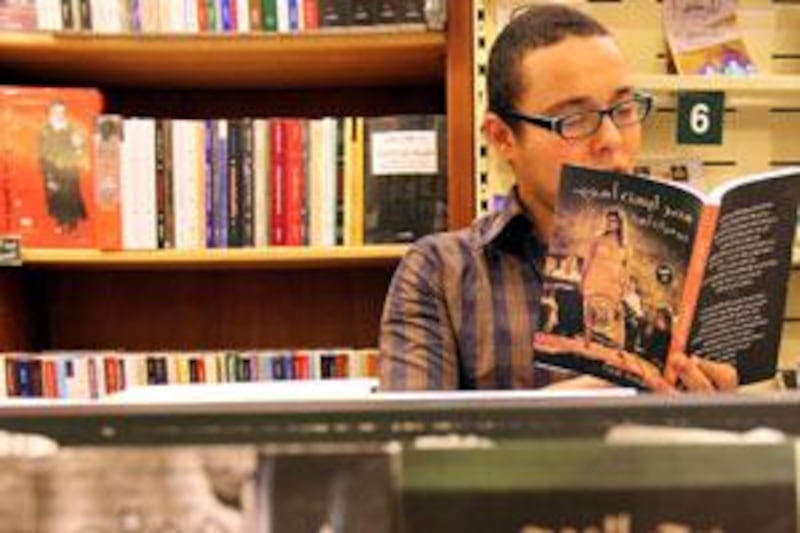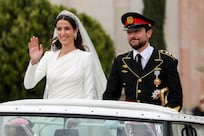"Translate advertisements, subtitles, the directions on medicine bottles - it's all grist for your mill, you learn from it all." That's the advice of the translator Humphrey Davies, the man responsible for bringing Alaa al Aswany's The Yacoubian Building (2003), Elias Khoury's The Gate of the Sun (2007) and Bahaa Taher's Sunset Oasis (2009) to readers of English. Davies was speaking as part of a lecture series organised by the recently established Translation Studies Centre at the American University in Cairo. The centre is one of many new initiatives in the region to encourage translation from, and into, Arabic.
Starting next year, the centre will offer a one-year diploma and a two-year master's degree. It will sponsor lectures as well as workshops and seminars for professional translators, to encourage them to join an ongoing, collective conversation about the theory and practice of their craft. According to Samia Mehrez, the AUC literature professor who heads the project, the centre's mission is to "contribute to Egypt's cultural and intellectual life through the formation of a new generation of translation theorists, researchers and practitioners".
Davies is one of the pre-eminent Arabic translators working today. He has translated at least a book a year since becoming, as he puts it, "hooked" in 1997. In addition to the titles mentioned above, he has done Thebes at War by Naguib Mahfouz (2003), Pyramid Texts and The Mahfouz Dialogs by Gamal al Ghitani (both in 2007), Black Magic by Hamdy el Gazzar (2007), the breakthrough novel by Ahmed Alaidi, Being Abbas el Abd (2006), and the recently released Life Is More Beautiful than Paradise, by Khaled al Berry (2009).
Davies often picks new works, ones that have an element of stylistic experimentation or that exemplify what he describes as the "melting of formerly fairly strict barriers between colloquial and formal Arabic". His lecture was the second in the "In Translation" series. The first, in December of last year, was by Denys Johnson-Davies, 88 (no relation to Humphrey Davies), who was the first to translate works such as Tawfiq al Hakeem's The Sultan's Dilemma, Tayyeb Saleh's Season of Migration to the North, as well as poetry by Mahmoud Darwish and novels by Naguib Mahfouz.
Johnson-Davies read passages from his memoir, Memories in Translation (2006), in which he recalls that when he began translating some of the most famous 20th-century Arab writers, "there was no publishing house in London employing anyone interested in modern Arabic literature or capable of reading a word of Arabic". What Arabic literature was published, was confined to "the academic cupboard" - to university presses and readers with a specialised interest in the Middle East.
The Nobel Prize for Literature awarded to the Egyptian novelist Naguib Mahfouz in 1988 was a turning point of sorts. Neil Hewison, the associate director of AUC Press, says that after the Nobel, Mahfouz "got a lot of attention - people had not realised there was literature in the Arab world they could read". Mahfouz remains the best-known and most widely translated Arab author, his work available in at least 40 languages. Yet, Hewison notes: "We were optimistic [that Mahfouz's success] would open the doors to all Arabic writing - but it didn't, or not as wide as we thought. It took much longer? it took additional successes like The Yacoubian Building."
Al Aswany's best-selling work has had a profound impact on the Arab literary scene and on the place of Arabic literature in the global book market. "Translations from the Arabic are clearly more in demand now than they were 20 years ago," Davies - who translated the hit novel - noted. Other contemporary works translated from Arabic - such as Khaled al Khamissi's Taxi and Rajaa al Sanea's Girls of Riyadh - have also attracted western readers.
"There have been some remarkable breakthroughs, enough to represent a phenomenon," says Andy Smart, an editor at the Bloomsbury Qatar Foundation, a new publishing venture that will print books in both English and Arabic. Numerically, the niche for translation from Arabic remains extremely small - not to say infinitesimal. Introducing the In Translation lectures, Mark Linz, the head of the AUC Press, observed: "There are roughly one million books published every year. Ten per cent of them are translations. Fewer than one per cent of that are translations from Arabic."
This is just one of many staggering statistics often invoked when discussing Arabic literature's general absence from the international stage. The dearth of literature translated from Arabic is supposedly a product of the western reader's lack of interest in or discomfort with the work of unknown foreign authors. High illiteracy and low purchasing power among the Arab public also means that relatively few books are published in the Middle East to begin with. The 2003 Arab Human Development Report published by the United Nations Development Programme pointed to fewer than 6,000 titles published in the Arab world, compared with 100,000 in North America. And Arab publishers seldom have good marketing or distribution networks.
All this notwithstanding, it's clear that Arabic literature in translation is enjoying a mild vogue. Just last month, it was celebrated in The New Yorker, where the critic Claudia Roth Pierpoint wrote that "Arabic novels offer a marvellous array of answers to questions we did not know we wanted to ask". Obviously, Davies suggested, the events of September 11, 2001, "had something to do" with the current popularity of Arabic novels. Western readers were more aware of and more curious about the Middle East now.
Yet having struggled to escape the academic ghetto, Arabic literature now finds itself often defined by its anthropological value or political relevance. The Yacoubian Building is read more often in political science classes in the United States than in literature ones. The work of female Arab writers, meanwhile, is often marketed as offering a revelatory peek behind the veil of the mysterious Orient.
Although he has a positive view of the literary market place, Davies discussed the pitfalls of commercial publishing, noting that sometimes editors outside the Arab world had "decided ideas of how a book should sound". He noted, in this regard, the "exceptional role" of AUC Press: the not-for-profit publisher had printed 150 titles as part of its mandate to make available quality contemporary Arabic literature, regardless of its commercial potential.
Last year, AUC went into partnership with Haus Publishing in London to create a new publishing house, Arabia Books. One of their collaborations - Farouk Abdel Wahab's translation of Gamal al Ghitany's The Zafarani Files - has been shortlisted for the Best Translated Book Award from the international literature website Three Percent. Another AUC Press innovation was the establishment, in 1996, of the Naguib Mahfouz Medal for Literature, a prize that entails automatic translation into English. Today this prize has been joined by many new and dramatic initiatives in the region - particularly in the UAE - that spotlight Arabic literature and culture, and foster its translation.
The International Prize for Arabic Fiction, also known as the Arab Booker, was established in 2008. One of the main goals of this collaboration between the Emirates Foundation and the Booker Prize Foundation is to "increase global readership of Arabic literature", by giving the shortlisted and winning novels the kind of media exposure and official recognition that often encourages publishers. The project has been remarkably successful: Bahaa Taher's Sunset Oasis, the 2008 winner, was published in English by Sceptre and was reviewed in all the major British newspapers. Youssef Zidan's Azazeel, the 2009 winner, is reported to be on the way from Grove Atlantic. And as Hewison says: "Once the shortlist [for the Arab Booker] has been announced, these authors get snapped up by an agent or a publisher in the West."
Another ambitious new project focuses on translation into, rather than from, Arabic - an area in which the region also seems to suffer from a great weakness. The Kalima initiative translates classics of western science, humanities and literature into Arabic, hoping to address "the translation drought" in the Middle East. The website for Kalimat - which is funded by the Abu Dhabi Authority for Culture and Heritage - notes an oft-cited statistic that more books are translated into Spanish every year than have been into Arabic in the past 10 centuries. Trying to fill this void, Kalimat is translating everything from Kant and his Critical Philosophy to Kafka on the Shore by Haruki Murakami to Barack Obama's autobiography.
The increase in interest and funding for translation has meant that translators of Arabic have themselves made some gains. When Johnson-Davies started out as a translator, he was paid no commissions but would split royalties with the author - meaning, in practice, that often he would earn next to nothing. "The translator had to do the work and hope that he'd make something out of it," he writes in his memoir. For his part, Davies recounted how he was once asked by a publisher: "Surely you don't expect to make a living at this?" He told his audience at the recent talk that he was pleased to be able to answer in the affirmative.
Meanwhile, Arab writers are acutely aware of the tangible and intangible benefits of translation, especially into English. Regardless of whether their work is a best-seller of Yacoubian proportions, for many authors, says Hewison, translation is "the mark of success". Given that only a dozen or so titles are translated every year, these are scrutinised and sometimes criticised as not representing "the best" of Arabic literature, or for supposedly pandering to western stereotypes and markets.
Translators from under-represented languages such as Arabic wield considerable influence over what books reach a western public. Johnson-Davies says: "Arabic translators have more power and more responsibility [than translators from other languages] because they decide what should be translated." Davies emphatically rejects that responsibility, choosing the books he translates on the basis of personal taste ("an instinctive gut feeling that I like a book"). For him, the idea that certain books and not others are worthy of translation reflects a "tiresome perspective on books and freedom of expression". Publishers would pick books that they expect to sell, he said, but that "doesn't equal crass commercialism or a plot to manufacture a prejudiced or tendentious image of country A, B or C".
Davies credited his love of literature ("I'm a wordy person," he said) and diversity of experience in the Arab world for his formation as a translator. His early studies at Cambridge gave his Arabic its grammatical and literary foundations; his work for NGOs in Sudan, Palestine, Egypt and Tunisia exposed him to different dialects and various registers of professional Arabic; his collaboration on the el Said Badawi Dictionary of Egyptian Arabic imbued him with "respect for colloquial Arabic". He continued to learn, he said, and to live in Cairo because "the rent is cheaper? and I can't imagine keeping up with the language from anywhere outside the Arab world".
To be a good translator, Davies argued, one needs to be a "connoisseur of one's own language". This point is echoed by many others in the field. Jonathan Wright - the translator of Taxi and Azazeel - credits his experience as a reporter with giving him one of the translator's key skills. "Knowing what the text means is the first stage," he says. "Stage two is presenting it in a way that's readable and easily comprehensible, and that comes from the practice of writing, not the practice of translation."
After his talk, Davies answered questions such as: Who is your ideal reader? ("Someone like myself"); Do you think there are untranslatable texts? ("Someone once said there are only texts that haven't found their translator yet"); and is your relationship to the text one of submission or control? ("Submission"). Davies likened himself to an actor, "interpreting" each work. Translating, he said, was "a way of learning, of putting oneself in others' shoes".






